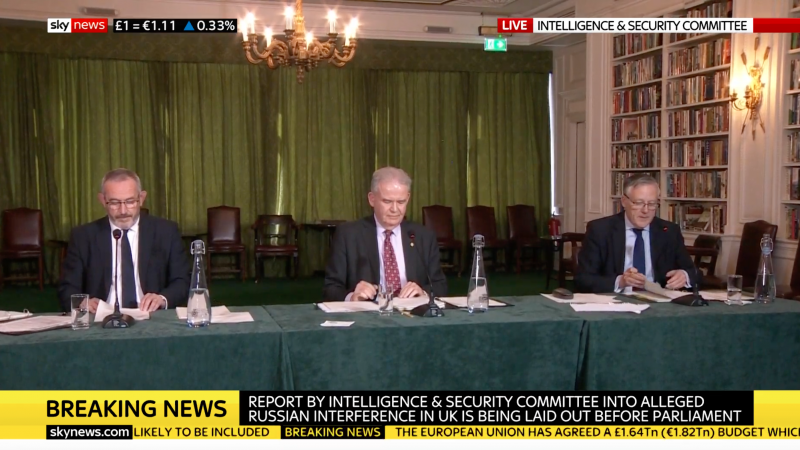
Members of the security and intelligence committee have said that the government “actively avoided” looking into whether Russia interfered in the Brexit referendum in 2016.
In a press conference this morning, MPs Julian Lewis, Stewart Hosie and Kevan Jones discussed the findings of the committee’s long-awaited report into the nature of Russian interference in the UK.
Members said that “the report reveals that no one in government knew if Russia interfered in or sought to influence the [Brexit] referendum because they did not want to know”.
Shadow Foreign Secretary Lisa Nandy has called on the government to “study the conclusions of the report carefully and take the necessary steps to keep our country safe”.
Commenting on the release of the report, she said: “It is extraordinary that the Prime Minister, Boris Johnson, took the political decision last October ahead of the general election to block the publication of this important report that systematically goes through the threat Russia poses to the UK’s national security.
“The report is very clear that the government has underestimated the response required to Russia and it is imperative we learn the lessons from the mistakes that have been made.”
"The report reveals that no one in government knew if Russia interfered in or sought to influence the [Brexit] referendum because they did not want to know"
Stewart Hosie MP says government "actively avoided looking for evidence that Russia interfered"https://t.co/XqUf6IhKR0 pic.twitter.com/Y6nNw64bG3
— BBC News (UK) (@BBCNews) July 21, 2020
Committee members also explained that reasons given by the government for the delay to the publication of the report, completed over nine months ago, are “categorically not true”.
Jones said that the government had “spent the last week trying to discredit it saying that there’s nothing in it or it’s out of date”, and that “motivations for that are obviously for government and the Prime Minister to answer for”.
The report found that “there is credible open source commentary suggesting that Russia undertook influence campaigns during the 2014 Scottish independence referendum”.
Committee members declared that the government “clearly let us down” in failing to investigate Russian interference afterwards, and concluded that “serious questions need to be asked”.
The paper published today revealed that in response to a request for evidence on Russian interference into the Brexit referendum, MI5 “provided just six lines of text” to the committee.
The document described “extreme caution amongst the intelligence and security agencies at the thought that they might have any role in relation to the UK’s democratic processes, and particularly one as contentious as the EU referendum”.
The report added: “This attitude is illogical; this is about the protection of the process and mechanism from hostile state interference.”
It reported that the committee has “not been provided with any post-referendum assessment of Russian attempts at interference”, and drew a “stark contrast” with the US response to reported interference in the 2016 presidential election.
It concluded: “The UK intelligence community should produce an analogous assessment of potential Russian interference in the EU referendum and that an unclassified summary of it be published.”
The 48-page document also reported that “a number of members of the House of Lords have business interests linked to Russia, or work directly for major Russian companies linked to the Russian state”.
It suggested that “these relationships should be carefully scrutinised, given the potential for the Russian state to exploit them”.
The report highlighted that the MPs code of conduct requires them to register individual payments they receive of more than £100 for any employment outside of parliament – but that this does not apply to the House of Lords.




More from LabourList
Antonia Romeo appointed to lead civil service as new Cabinet Secretary
‘If Labour is serious about upskilling Britain, it must mobilise local businesses’
Stella Tsantekidou column: ‘What are we to make of the Labour Together scandal?’